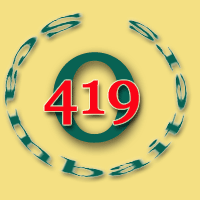
• Home •
Victim´s Story •
Fraud Prevention •
Project GSO •
Hall of Shame •
LINKS •

All About Financial Crimes II
What´s meant Bad Check?
Definition:
Bad check is a check that is dishonored on presentation because of insufficient funds; "issuing a bad check is a form of larceny".
Civil & Criminal Penalties
Bad checks, also known as NSF checks, bounced checks, rubber checks, etc., can be a big problem for any credit department. There are both civil and criminal penalties for this unlawful act, although it is much more costly and difficult to prove a criminal case.
What´s meant Passing Bad Checks?
Passing bad checks is a way that people get what they need now and hope to pay later. Trouble is, their timing is off or they have no intention to pay later and the check bounces. The merchant is left with a bad check. Whether you pass bad checks because you're dishonest or it's a simple accident, stiff penalties can apply. Criminal charges can be brought against you if the DA can prove all criminal elements especially fraud and intent. Merchants lose hundreds of thousands every year in bad checks and the consumer who pays by legitimate means ends up picking up the tab. You cannot however, escape risk free.
Unpleasant consequences for writing bad checks
There are a number of unpleasant consequences for writing bad checks:
-You could be charged fees
-Your bank or credit union could charge you an overdraft fee, which is typically around $25.00 per check
-The place you wrote the check could also charge you a fee
-The place you wrote the check could refuse to take any more checks from you
-You could receive calls and letters asking you to repay the money
-Your name and account information could be reported to an agency, like SCAN, Telecheck, Equifax Check Solutions, or others where it would be placed on a bad check list
-Then, other places could refuse to take your checks
-Your bank could close your checking account
-You would not be able to write checks
-Your bank could report your closed account to ChexSystems. As a result other banks could refuse to open a checking account for you for some time.
-You can ruin your debit history
Is a check considered a written contract?
A check is not considered a "contract" although some may argue that it is (because it's a signed promise to "pay"). A contract requires consideration by both parties (an offer and acceptance) and consists of nothing more than an (enforceable) promise to pay by one party but no contract was drawn up by the other party.
What is the SOL and UCC for checks?
SOL = statute of limitations dealing with checks. Those would trump any general statute of limitations and even the UCC limitations.
UCC = UCC is where you usually find the time limitations on checks.
The UCC is not a federal statute but rather a system set up to structure commercial transactions. Since it isn't a federal rule there would be no supremacy clause (as in who rules state or federal) but rather the state could choose to adopt it or not. Most states have adopted it. According to FindLaw, a more specific statute rules over (trumps) a more general statute. Therefore if a certain state has a more specific statute it will often trump (rule over) the UCC entirely. Bottom line: read the UCC but read the state rule as well and see which one applies--, is more specific or offers more protection. You will usually find the SOL for collecting the check in the state code.
CHECK FRAUD DESCRIBES A NUMBER OF ACTIVITIES INCLUDING:
Check Kiting - this involves opening multiple checking accounts so that checks from one account are written to cover checks from another account. Recent legislation has required banks to make funds available sooner and this has resulted in even more occurrences of check kiting.
Counterfeiting - the ease of desktop processing and the high quality of readily available printing and copying have made counterfeiting a significant factor in check fraud. These methods are used to create or duplicate checks. In addition, counterfeiting can involve chemical alteration to remove some or all of the information on a check so that it can be replaced with other information.
Forgery - two common types of forgery exist. Stolen checks can be endorsed and presented for payment at stores or banks. This often also involves the use of false identification documents. The other common type of forgery involves employees issuing checks without authorization.
Paperhanging - this term describes purposefully writing checks on closed accounts or reordering checks for closed accounts.
Frequently, check fraud starts with the theft of a check. A blank check might be stolen from your home or car. An old or canceled check could be stolen from your garbage. A check you have written to pay a bill could be stolen from the mailbox.
WHAT CAN YOU DO TO PREVENT CHECK FRAUD?
Since most check fraud starts with the theft of a check, you should keep your checks as safe as possible.
- Always reconcile your bank statements as soon as you receive them.
- If you use automated teller machines, do not write your PIN number on your card or anywhere in your wallet or check book for a thief to find.
- Don't use checks or deposit slips as scratch paper.
- Shred old checks and bank statements before you throw them away.
- Fill in the payee line and amount line completely on any checks you write. Don't leave blank space that someone can alter.
- Don't provide your bank information over the telephone.
- Don't place outgoing mail in an unlocked box.
- Install a lock on your mailbox. You can cut a slit in the mailbox large enough to slide mail through but not large enough to fit a hand through.
WHAT IF YOU ARE A VICTIM OF CHECK FRAUD?
If you are a victim of check fraud, it is in your best interest to call these institutions:
- Your local bank or credit union. Report the fraudulent activity and ask them to advise you on what steps to take next. For example, should you close the account, put a stop payment on all checks other than ones you know you wrote, whom else should you notify, and so forth.
- Your local law enforcement office. Give them the necessary information and answer all their questions in detail.
- The check service companies - these firms gather information on bad checks and then report that information to their customers.
Report to these companies that you are the victim of fraud and that you did not write the checks that were stolen. Ask what other information you might need to provide. Telephone numbers for the largest check service companies are:
Check Rite 800-766-2748
ChexSystems 800-513-7125
Equifax-Telecredit 800-437-5120
NPC 800-262-7771
Telecheck 800-685-5000
Equifax Risk Management Services 800-898-3068
Equifax 800-556-9000
CRA Security Systems 800-486-0955
The credit bureaus. Again, tell these agencies that you are a fraud victim and your checks were stolen. Ask what other information you might need to provide.
Equifax
PO Box 105069
Atlanta, GA 30348
800-505-2136
Trans Union
PO Box 6790
Fullerton, CA 92634
800-680-7289
Experian
PO Box 1017
Allen, TX 92634
800-301-7195
©by GSO • Contact